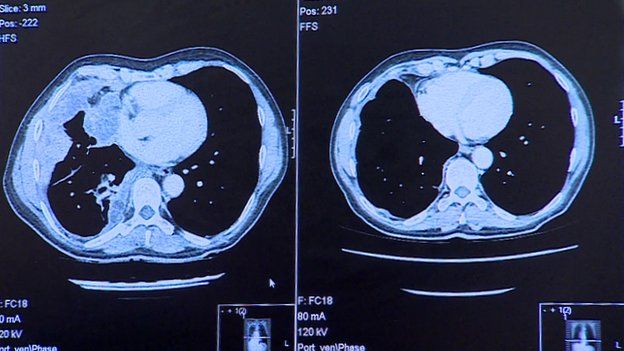Skin cancer trial results 'exciting'
- Published
- comments

The results of two international trials against advanced skin cancer have been hailed as "exciting and striking".
Both treatments, for advanced melanoma, are designed to enable the immune system to recognise and target tumours.
The findings were released at the American Society of Clinical Oncology conference in Chicago.
The experimental drugs, pembrolizumab and nivolumab, block the biological pathway cancers use to disguise themselves from the immune system.
Advanced melanoma - skin cancer which has spread to other organs - has proved very hard to treat.
Until a few years ago average survival was around six months.
Improved survival
In a trial of 411 patients evaluating pembrolizumab - 69% of patients survived at least a year.
The drug, which used to be known as MK-3475, is also being tested against other tumour types which use the same mechanism to block attack from the immune system.
Dr David Chao, consultant oncologist at the Royal Free London NHS Foundation Trust, is conducting trials in both melanoma and lung cancer patients. He said:
"Pembrolizumab looks like it has potential to be a paradigm shift for cancer therapy."
One of his patients, Warwick Steele, aged 64, has been receiving infusions of pembrolizumab every three weeks since October.
Before the treatment started he could barely walk because the melanoma had spread to one of his lungs and he found it hard to breathe.
"I got tired simply standing up and was literally too exhausted to shave. But now I feel back to normal and can do gardening and go shopping".
Scans of his lungs - shown above - reveal that after just three infusions, the drug appears to have completely cleared the cancer from his lung.
Warwick Steele says the treatment has cleared cancer from his lung
Combination therapy
The other drug, nivolumab, was tested in combination with an existing licensed immunotherapy, ipilimumab.
In a trial of 53 patients, survival was 85% after one year, and 79% after two years.
John Wagstaff, Prof of medical oncology at Swansea College of Medicine is part of a larger trial of these two drugs.
He said: "I am convinced that this is a breakthrough in treating melanoma.
"The trial is still "blinded" so we don't know what treatments the patients are getting, but we have seen some spectacular responses."
Professor Peter Johnson, Cancer Research UK's chief clinician, said: "It's exciting to see the range of new treatments that are emerging for people with advanced melanoma."
But doctors are urging caution. The results which have been published are of Phase I, early stage trials.
Much larger Phase III trials are underway involving many UK hospitals.
Only when they report, in about a year's time, can clinicians be sure what the likely benefits will be.
Like all drugs, the experimental treatments have side effects. Warwick Steele said he experienced night sweats and even had two brief blackouts when on the new drug.
But he said it was well worth it, and doctors were now treating these symptoms.